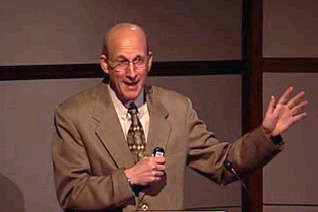Calendar of Climate Change
What would Thoreau think? Global warming at Walden Pond

Click here to watch Richard Primack on BUniverse. Download available on iTunesU.
Richard Primack,a Boston University College of Arts and Sciences professor of biology,speaks as part of the College of Arts and Sciences Discoveries series.Using the journals of New England naturalist Henry David Thoreau asa comparative guide, Primack and his students, particularly AbrahamMiller-Rushing (GRS’07), have been learning for the past five years howclimate change and global warming are influencing the behavior ofplants and wildlife in Boston.
In the 1850s, Primack says, Thoreau constructed a calendar of nature for Concord, Mass.He recorded the first flowering times of more than 300 plant speciesand the first spring arrival times of dozens of species of migratorybirds. Through their research, Primack and his students have learnedthat Walden Pondis thawing earlier than in Thoreau’s time, Concord plants are floweringabout eight days earlier, and migratory birds are arriving earlier.
“Thesechanges are direct indications that global warming is affecting thenatural world, even in New England,” Primack says. “And if globalwarming continues at this rate, it will have severe consequences onAmerican agriculture, forestry, and horticulture. The sea levels willrise and flood coastal areas, temperatures will increase, and tropicaldiseases will spread.”
Primack urges everyone to take action.“Start keeping a calendar of when things flower in your yard and keeptrack of temperature changes and when birds arrives,” he says. “Globalwarming is a serious subject that must be addressed.”
A question-and-answer session follows the lecture.
April 17, 2008, 7 p.m.
School of Management
About the speaker:
A biology professor at the Boston University College of Arts and Sciences, Richard Primackhas been studying climate change in Concord, Mass., for the past fiveyears. His method of using Henry David Thoreau’s notations of plantflowering cycles and bird migration patterns as a basis for researchinto the local effects of global climate change earned him a GuggenheimFellowship in 2006. He is the author of several books, including twoleading textbooks on biology conservation, Essentials of Conservation Biology and A Primer of Conservation Biology. He is the president of the Association for Tropical Biology and the editor-in-chief of the journal Biological Conservation.
Comments & Discussion
Boston University moderates comments to facilitate an informed, substantive, civil conversation. Abusive, profane, self-promotional, misleading, incoherent or off-topic comments will be rejected. Moderators are staffed during regular business hours (EST) and can only accept comments written in English. Statistics or facts must include a citation or a link to the citation.